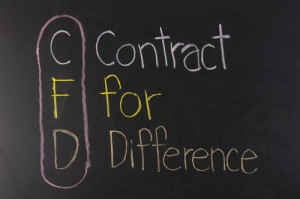Introducing CFDs/Spread Betting
Contracts for Difference (CFDs) and financial spread betting are derivative products that allow an investor to benefit from movements in the price of an asset or index without ever owning it.
Each offer exposure to thousands of underlying markets and can deliver profits when prices are rising or falling.
CFDs and spread bets trade on margin which requires the purchaser to lodge only a fraction of the market position they have; this can magnify gains, or losses if the market goes against you.
Leveraged trading means that it is possible that you could lose more than your original investment.
The spread bettor decides how much to trade per ‘point’ and therefore to some degree the level of risk they are exposed to.
About CFDs and Spread Betting
Choice – exposure to thousands of underlying markets Derivative – benefit from movements in the price of an asset or index without owning it. Flexible – can deliver profits when prices are rising or falling Variety – access markets you can’t easily buy – sectors, indices, commodities, FX, interest rates. Leveraged – trade on margin so you lodge only a fraction of the market position – magnifies gains, or losses. Risk – potential to lose more than your original investment Tax – profits on spread betting are free from capital gains tax and stamp duty Hedge – shorting to hedge against an equity position losing ground Control – the size of the bet per point movement you make determines your level of risk
Flexible – can deliver profits when prices are rising or falling Variety – access markets you can’t easily buy – sectors, indices, commodities, FX, interest rates. Leveraged – trade on margin so you lodge only a fraction of the market position – magnifies gains, or losses. Risk – potential to lose more than your original investment Tax – profits on spread betting are free from capital gains tax and stamp duty Hedge – shorting to hedge against an equity position losing ground Control – the size of the bet per point movement you make determines your level of risk
Inside CFDs and Spread Betting
Inside CFDs and Spread BettingWhat is Spread Betting?What are CFDs?What is Leverage?Spread Betting 101CFDs 101
Inside CFDs and Spread Betting
CFDs and financial spread betting enable investors to profit from the movement in the price of shares, indices, commodities and financial instruments without ever owning them. When placing a bet, or entering into a contract, you predict whether a particular asset will go up or down in value; the size of your reward reflects how right you are and the size of your wager. They trade on margin which can magnify gains, or exacerbate losses; the volatility of an asset combined with geared trading can very quickly achieve big returns, but it is equally possible to incur hefty losses that outstrip your initial stake. CFD trading and financial spread betting are not for the faint hearted and you will be required to prove your competence to trade them to your broker. Choose your broker wisely as there is variety in terms of their terms of business, technical platform, and fees and charges; select a broker that supports the trading world’s ‘dead-man’s handle’ – stop loss orders, that can guard against catastrophic losses. Most will allow you to practice on a dummy account until you are sufficiently confident to trade with your hard-earned but the DIY investor should never allocate  more money to CFDs and spread betting than they are prepared to lose.
more money to CFDs and spread betting than they are prepared to lose.
What is Spread Betting?
Spread betting is a way of investing in the movement of a particular market such as foreign exchange, shares or indices, without actually owning the asset. When financial spread betting, you speculate on the direction in which the price of a financial instrument will move. If it moves the way you predict, your profit will grow the further it goes. However, if the market moves against you, your loss will also increase as the price movement becomes greater. Betting on the price increasing is referred to as going long, while betting that it will decrease is called going short (or ‘shorting’). With spread betting, you predict an outcome, and the degree to which you are right or wrong determines the size of your profit (or loss). Spread betting is becoming increasingly popular, but it does come with high risks and the potential to lose more money than you originally stake.  Read more
Read more
What are CFDs?
A Contract for Difference (CFDs) is an agreement between two parties, typically the “buyer” and the “seller”, stipulating that the seller will pay to the buyer the difference between the current value of an asset and its value at contract time (If the difference is negative, then the buyer pays the seller). CFDs can be used to trade and speculate on the price movements of thousands of financial markets regardless of whether prices are rising or falling. CFDs are derivative products that allow the purchaser to trade on movements in the price of an underlying asset without ever owning it.  Read more
Read more
What is Leverage?
Trading on leverage (sometimes ‘gearing’) means achieving exposure to an underlying equity, index, commodity or currency pair for a fraction of the cost of buying the asset outright; this multiplier effect is achieved by borrowing against an initial investment and can enhance gains and magnify losses in equal measure. Gains can be greatly enhanced although losses may exceed the initial investment; leverage works when gains exceed the cost of borrowing associated with taking a certain position – companies use leverage when they issue bonds (debt) to finance operations in the hope that the returns that are achieved outweigh the cost of servicing the interest payments to bondholders. Most people that have borrowed money to purchase a property have used leverage; they have leveraged the value of their deposit to secure a mortgage that gives them ‘exposure’ to a more valuable asset than they could afford to purchase outright – their house.  Read more
Read more
Spread Betting 101
Financial spread betting allows you to benefit from the movement in the price of shares, commodities and a number of other financial indices and markets, without actually purchasing the individual investment itself. The ‘spread’ referenced is the difference between the price the spread betting company will pay for a stock and the price it will sell it for. The spread betting sector is highly competitive with companies competing to woo customers with the most attractive (‘tightest’) spreads on shares; the spread is measures in points or ‘pips’.  Read more
Read more
CFDs 101
Contracts for Difference (CFD) allow traders to make money from predicting how shares, or other financial instruments, will perform over time. CFD are ‘derivatives’ which means they derive their value from movements in the stock market without requiring you to purchase any shares. In order to do this the investor forms an agreement with a broker – the ‘contract’ – committing to exchange the difference in value of specified shares between the opening and closing of a CFD. The return you receive at the end of the agreed term depends upon the number of shares included in the contract and the rise or fall in their price.  Read more
Read more















